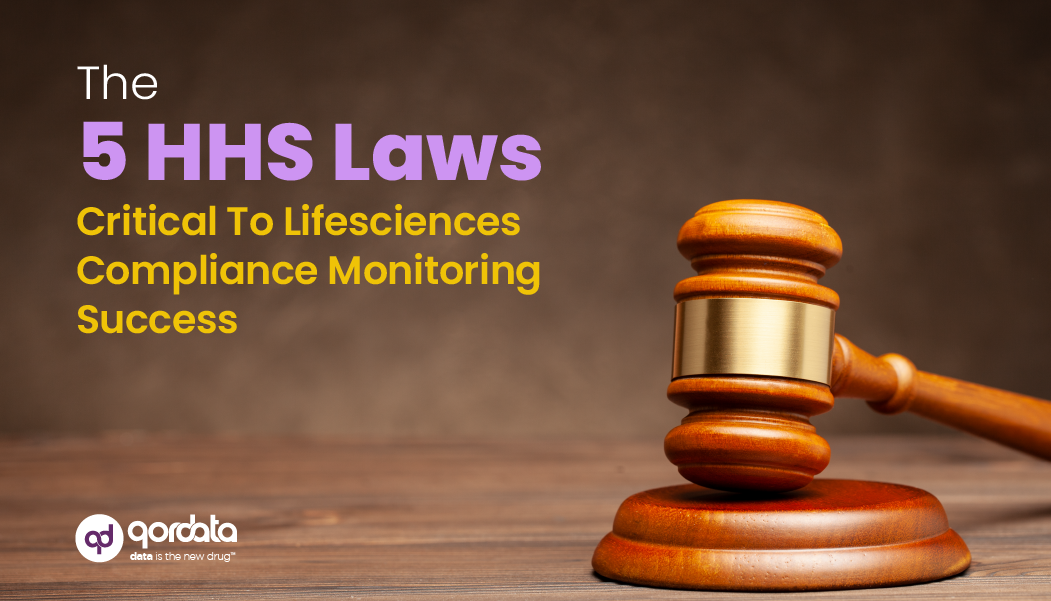Table of Contents
ToggleCMS Open Payments reporting stands out as a critical aspect of life sciences compliance that demands meticulous attention from compliance officers.
It serves as a transformative force, driving a paradigm shift in how stakeholders perceive transparency, integrity, and accountability within the industry. Open Payments Reporting builds trust and empowers patients with insights into the financial relationships that influence their healthcare choices.
Challenges and Pitfalls in CMS Open Payments Reporting
Be Confident Regarding Your Reports with Our CMS Open Payments Reporting Solution
CMS Open Payments Reporting: FAQs for Compliance Officers
To address some of the challenges in CMS Open Payments reporting, we have compiled a comprehensive list of frequently asked questions (FAQs) for compliance Officers.
1. What is the relationship between Open Payments and the Physician Payment Sunshine Act PPSA)?
Answer: Open Payments and the Physician Payment Sunshine Act (PPSA) are essentially two names for the same program. The PPSA was enacted in 2010 as part of the Affordable Care Act and mandated the reporting of financial interactions between life sciences companies and healthcare providers to increase transparency in the healthcare system. In 2013, the program officially launched and adopted the name Open Payments.
Therefore, Open Payments is the implementation mechanism for the PPSA. It refers to the system and platform established by the Centers for Medicare & Medicaid Services (CMS) to facilitate the data collection, public disclosure, and review of these financial interactions.
Here’s a breakdown of the relationship:
- PPSA: The law establishing the mandatory reporting requirements.
- Open Payments: The system implementing the PPSA regulations, including data collection, reporting, and public disclosure functionalities.
They are essentially two sides of the same coin, with the PPSA dictating the what and Open Payments handling the how. So, when you encounter either term, know that they refer to the same program aimed at increasing transparency in financial relationships within the life sciences industry.
2. What happens when a covered recipient disputes a record, and it is not resolved by the company?
Answer: Physicians have a 45-day period to review and initiate any disputes they may have, and the Industry has a 15-day period to resolve and submit corrections. Disputed data that is not resolved will be published on the public website on June 30 each year, but it will be marked as disputed.
If it is resolved after publication, there is a one-time update at the end of this calendar year, showing the correction at that time and in the future.
Related: Guide to Solving Open Payments Disputes
3. Are the payments made to HCPs personally reported?
Answer: No, transfers of value may be meals or travel, and research payments may have only been made to the University but could be attributed to the PI as an indirect payment.
Moreover, payments may be misreported (e.g., sponsored research or travel support reported under consulting income), or the same payment could be reported more than once.
4. Who is a physician or covered recipient under the Sunshine and Support Acts?
Answer: For Open Payments, a “physician” is any of the following professionals who are legally authorized by the state to practice, irrespective of whether they are Medicaid, Medicare, or Children’s Health Insurance Program (CHIP) providers:
- Doctor of Medicine or osteopathy
- Doctor of Dental Medicine or dental surgery
- Doctors of podiatric medicine
- Doctor of Optometry
- Chiropractors
As of January 1, 2021, expanded coverage under the Support Act includes the following providers:
- Physician assistants
- Nurse practitioners
- Clinical nurse specialists
- Certified registered nurse anesthetists and anesthesiologist assistants
- Certified nurse-midwives
Note: Medical residents are NOT considered physicians for this program.
5. What value should an applicable manufacturer assign to clinical study drugs provided to principal investigators as part of the research agreement?
Answer: Applicable manufacturers are not required to assign a specific value to clinical study drugs provided to principal investigators.
Comparatively applicable manufacturers should report the total amount of the research payment, including all research-related costs for activities highlighted in a written agreement, research protocol, or both, as specified in 42 C.F.R. § 403.904(f)(1)(ii).
6. How will CMS validate the information submitted about non-physician practitioners?
Answer: CMS will use a combination of data contained in the NPPES and PECOS systems, a commercial data source of aggregated data from state boards, and other sources to validate reported data on non-physician practitioners (Physician Assistants, Nurse Practitioners, Clinical Nurse Specialists, Certified Registered Nurse Anesthetists & Anesthesiologists Assistants, and Certified Nurse-midwives).
7. How are applicable manufacturers and group purchasing organizations selected for an audit?
Answer: The Centers for Medicare & Medicaid Services (CMS) are authorized to conduct audits, inspections, investigations, and assessments on the books, contracts, records, documents, and other pertinent evidence of applicable manufacturers and applicable group purchasing organizations. This is in relation to their adherence to the obligation of promptly, accurately, or comprehensively submitting records to Open Payments (refer to 42 CFR § 403.912(e)(2)). Any entity involved in reporting is subject to potential audit selection. CMS employs a selection process that combines risk-based criteria and random sampling to identify entities for audit. Risk-based standards encompass various factors, such as a history of prior non-compliance, credible third-party compliance reports, anomalies or inaccuracies in reported data, and unusual or inconsistent patterns.
8. How does a group purchasing organization determine the value of journal reprints provided to covered recipients?
Answer: The cost of a journal reprint should accurately reflect the expenses incurred by an applicable manufacturer or Group Purchasing Organization (GPO) when obtaining the reprint from the publisher or another distributor. To provide transparency, applicable manufacturers and GPOs can submit an assumptions document, elucidating any assumptions made while determining the value assigned to journal reprints.
9. Is a hospital not listed on the Open Payments teaching hospital list considered a teaching hospital covered recipient?
Answer: No, according to the CMS Open Payments guidelines, a teaching hospital covered recipient is specifically defined in 42 C.F.R. § 403.902 as any institution that received payment under 1886(d)(5)(B), 1886(h), or 1886(s) of the Social Security Act in the most recent calendar year for which such information is available. The conclusive list of all teaching hospital covered recipients for Open Payments reporting purposes during the specified reporting year is available on www.cms.gov/openpayments. This Teaching Hospital List undergoes an annual update.
10. How should a long-term medical supply or device loan be valued?
Answer: CMS does not dictate the method for establishing the valuation of a device loan. The reporting entity is responsible for making a reasonable determination in this regard. To enhance transparency, reporting entities are recommended to utilize the assumptions document. This document serves the purpose of elucidating reporting methodologies and highlighting any distinctive reporting circumstances during the completion of data submissions.
11. In what formats is the data presented?
Answer: CMS provides Open Payments data through various channels to cater to diverse users and their preferences:
Open Payments Search Tool: Accessible on openpaymentsdata.cms.gov, this standard search interface enables site visitors to obtain instant results. Users can retrieve detailed information about individual physicians, teaching hospitals, or companies making payments.
Data Explorer: Users can choose a dataset and personalize their view using filters, sorting options, and other functionalities. This allows them to create customized, targeted perspectives of the data and generate visualizations such as charts and graphs.
Data Downloads: Data can be downloaded in comma-separated values (.csv) format, enabling users to open and explore the information using their preferred computer software. However, this option requires robust data viewing software capable of handling and displaying large datasets.
12. How will I know if the physician license submitted as part of a payment record has been identified as expired per CMS sources?
Answer: Records containing physician licenses that CMS sources identify as expired during the entirety of the record’s program year will receive a warning message and be denoted with a warning icon on the “Payment Category” page next to the “Record ID”. A warning message will appear on the individual record’s “Record ID” page that specifies the expired license(s), if any.
Additionally, if the record(s) were submitted via bulk file, a “Processed with Warning” message will be displayed on the bulk file’s “File ID” page, and the error log for the bulk file will contain expired license warnings for each relevant record, with the expired license(s) specified. Expired license warnings will not prevent a record from successfully processing and going through final submission. However, users should review these records to confirm whether the physician’s license is active or expired. If the license is expired, the record should be updated to remove the inactive license. The record should be deleted if the physician has no licenses active in the program year.
13. Is a distributor for an applicable manufacturer responsible for reporting to CMS payments or other transfers of value to health care professionals?
Answer: If a distributor holds ownership rights to any covered drug, device, biological, or medical supply, it falls under the definition of an applicable manufacturer as outlined in 42 C.F.R. § 403.902. Consequently, the distributor is obligated to adhere to Open Payments reporting requirements. Ownership is established when a distributor takes possession of a specific inventory of products from the seller and holds the right to resell that purchased inventory. In cases where applicable manufacturers have products with titles held by distributors, reporting of payments or other transfers of value made by the distributor to covered recipients is not required by the applicable manufacturers. Instead, the distributor, which holds the title, assumes the same reporting responsibilities as applicable manufacturers and is accountable for reporting the transfer of value.
14. Is it reportable if an applicable manufacturer contributed to support a medical conference but did not have any say in the content, speakers, or agenda?
Answer: Unrestricted donations to a medical conference would not be subject to reporting under CMS Open Payments. Although there is no formal definition of an unrestricted donation, in this case, we can take that term to mean a grant given by a reporting entity to a professional association for use without any restrictions, pre-conditions, or post-conditions in order to assist the professional or educational association with its administrative or educational needs.
Following the criteria outlined in 42 C.F.R. §403.902 for an indirect payment, an applicable manufacturer supporting a medical/educational conference must disclose the payment if the reporting entity concludes that it falls within the parameters of an indirect payment as defined in 42 C.F.R. §403.902.
An indirect payment is defined at 42 C.F.R. §403.902 as a payment or other transfer of value done by an applicable manufacturer to a covered recipient through a third party where the applicable manufacturer either mandates, instructs, directs, or in any way influences the third party to deliver the payment or transfer of value, either wholly or partially, to the covered recipient.
15. Are payments or other transfers of value made to a physician’s immediate family member reportable?
Answer: Generally, applicable manufacturers and group purchasing organizations are obliged to annually disclose ownership and investment interests held by physicians or their immediate members of the family, per 42 C.F.R. 403.906(a)(1). These interests must be reported under the physician’s name, even if an immediate family member holds the ownership or investment interest. The report should specify whether the interest belongs to the physician or an immediate family member. According to § 403.906(b), the dollar amount invested by a physician or their immediate family member must be disclosed, while payments or other transfers of value should be reported only to a physician owner or investor, not to an immediate family member with an ownership or investment interest.
It is important to note two exceptions: Firstly, if an applicable manufacturer or a group purchasing organization makes a payment or transfer of value to an immediate family member of a physician on behalf of or at the physician owner or investor’s request (i.e., a third-party payment to the family member), it must be reported. Secondly, if the payment is provided to the immediate family member of a physician as an indirect payment to be passed through to the physician, it must also be reported as a payment or transfer of value to the physician, irrespective of whether the immediate family member is also an owner or investor.
16. Does CMS publish a covered recipient’s National Provider Identifier (NPI) on the Open Payments website?
Answer: Yes. Per 42 CFR 403.904(c)(3)(ii), the reporting entity is required to provide a covered recipient’s National Provider Identifier, if applicable. This information is included in the record’s information.
17. Can all payments made to a covered recipient during a reporting period for the same Nature of Payment category be combined into one payment?
Answer: Manufacturers subject to regulations can report payments occurring over multiple dates either separately or consolidate them into a single line item, specifically for the initial payment date. Furthermore, CMS grants flexibility regarding the specific date to be reported for a given nature of payment category. For detailed information, please refer to 78 FR 9473. Manufacturers must provide the date of payment or other transfer of value. In cases where there is a series of payments (e.g., a consulting fee disbursed monthly for three months) or a grouped set of payments, manufacturers are instructed to report the date of the initial payment or other transfer of value.
Related: Natures of Payment: Payments Categories Explained
18. Does CMS notify covered recipients when applicable manufacturers or applicable group purchasing organizations (GPOs) report data?
Answer: No. The CMS Open Payments system does not generate individual notifications to covered recipients when attributable information has been reported. Covered recipients may self-subscribe to the Open Payments list to receive program-related reminders, updates, and information regarding actionable items. These reminders include notifications such as deadline reminders, program updates/ CMS changes, and general announcements. As a reminder, covered recipients’ participation in the Open Payments program is voluntary, and they are responsible for their own registration in the Open Payments system and review of the data.
6 Steps to Increase the Effectiveness of Your CMS Open Payments Reporting Program
- Establish a clear understanding of CMS reporting requirements.
- Plan and strategize your CMS Open Payments Reporting Process.
- Implement a robust data collection process and quality controls.
- Utilize data analytics to gain insights and identify and remediate inaccuracies/incompleteness.
- Conduct internal audits and ensure compliance with CMS reporting requirements.
- Maintain continuous improvement of the reporting program.
Empower Your Reporting Process with Our CMS Open Payments Reporting Solution
Conclusion
In closing, Open Payments Reporting is a linchpin for transparency in healthcare. Compliance Officers play a pivotal role in navigating the intricacies of reporting requirements. Understanding the basics, addressing common FAQs, and implementing best practices are essential.
In essence, CMS Open Payments Reporting is a commitment to transparency, accountability, and maintaining the highest standards in healthcare. Compliance Officers are key architects in this endeavor, ensuring their organizations meet reporting obligations with precision and integrity.
Related Article:




